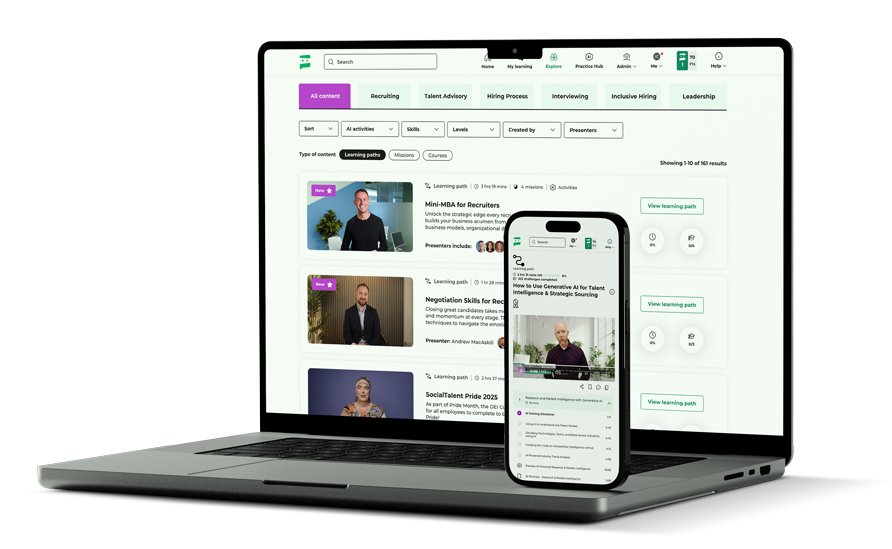
By David Deady
The recruitment landscape is evolving at a breakneck pace, and artificial intelligence is increasingly becoming a key player in that transformation. According to McKinsey research, 65% of orgnizations are already using AI in their operations – a statistic that has doubled in twelve months.
From streamlining mundane administrative tasks to providing deeper insights into candidate data, AI promises a future where recruiters can focus more on strategy and human connection. However, despite its potential, the adoption of AI in recruitment is often met with hesitation. Recruiters worry about losing the human touch, grappling with complex systems, or even facing job displacement.
This article aims to address those concerns and provide a roadmap for recruiters to embrace AI confidently, not as a replacement but as a powerful ally in their quest to find the best talent.

The Main Concerns of Recruiters When It Comes to AI
1. Loss of Human Touch
A primary fear among recruiters is that AI will depersonalize the hiring process. At its heart, recruitment is about building relationships, understanding a candidate’s motivations, and determining their organizational fit. These nuanced, people-focused aspects seem to be at odds with the efficiency-driven, data-focused nature of AI. Many recruiters fear that if algorithms take the front seat, candidates might feel they are being evaluated by a machine rather than a person.
Solution:
It’s crucial to emphasize that AI is not meant to replace human interaction but to enhance it. AI can handle repetitive tasks—such as screening resumes or scheduling interviews—allowing recruiters more time to focus on the human side of hiring. By integrating AI to assist with initial stages, recruiters are free to build deeper, more meaningful connections during outreach, interviews, and the final decision-making processes. Speaking with Natalie Glick, the Director of TA Strategy at BCG, she says that:
“Tech is there to help us, but the human needs to be there to make the decisions. Essentially it’s about finding out where the computer computes and the human engages.”
2. Lack of Contextual Understanding
One of the key advantages of human recruiters is their ability to understand subtle cues in communication. AI, on the other hand, can struggle with this. A candidate’s resume or LinkedIn profile might not tell the whole story, and AI may overlook context, leading to missed opportunities or inappropriate candidate rejections.
Solution:
Recruiters should see AI as a tool to gather and organize data, but they should always apply their own judgment to any final decisions. AI is best used for initial filtering, but when it comes to cultural fit and understanding soft skills, the recruiter’s experience and intuition are irreplaceable. Incorporating a “human-in-the-loop” system, where AI recommendations are combined with human review, can balance efficiency with empathy.
Learn more: Striking the Balance Between Automation and Human Decision Making, with Johnny Campbell
3. Bias and Ethical Concerns
AI is only as good as the data it’s trained on. If biased data is fed into the system, the AI will likely produce biased outcomes. This raises concerns about perpetuating or even amplifying biases in hiring, particularly when it comes to gender, race, or socioeconomic background. Furthermore, the opaque nature of some AI algorithms can make it difficult for recruiters to understand how decisions are being made, raising questions about fairness and accountability. Hiring bias and privacy concerns were listed as two top challenges in Workable’s latest Hiring and Work Survey.
Solution:
The industry as a whole must prioritize ethical AI. This means ensuring that AI systems are audited for bias regularly and that hiring decisions made by algorithms can be explained in clear, human terms. By championing transparency and ethical considerations, recruitment teams can help mitigate bias and foster more equitable hiring practices. Recruiters should also actively collaborate with AI providers to ensure their tools align with fairness principles.
Learn more: The Ethical Considerations of AI in Hiring
4. Job Security
There is an understandable fear that AI might automate recruiters out of their jobs. According to a CNBC report for example, almost a quarter of workers are concerned about AI making their roles obsolete. After all, if machines can sift through resumes and even conduct initial interviews, what role is left for human recruiters? This concern is particularly pressing for those who have built their careers around traditional recruitment practices.
Solution:
AI should be framed not as a replacement but as an augmentation of the recruiter’s role. By automating routine tasks like resume parsing and interview scheduling, AI frees up time for recruiters to focus on higher-level, strategic activities. This shift allows recruiters to evolve into talent advisors—leveraging insights from AI to make better decisions, guide hiring managers, and offer a more personalized experience for candidates. AI enhances the value that human recruiters bring to the table, making them more indispensable, not less.
5. Lack of Trust and Understanding
The “black box” nature of AI can be intimidating. Many recruiters don’t fully understand how AI makes its decisions, leading to skepticism about its accuracy and effectiveness. Without transparency, it’s difficult for recruiters to trust the technology, and this mistrust can prevent them from using AI tools to their full potential.
Solution:
Training and education are critical. By demystifying AI—explaining how algorithms work, how decisions are made, and how bias is addressed—recruiters can build confidence in the technology. Transparency is key; AI tools that provide clear, understandable reasons for their recommendations will be more easily embraced. By equipping recruiters with the knowledge to understand AI, they are more likely to trust and use it effectively.
Listen to SocialTalent’s AI expert, Maisha Cannon, explain the importance of navigating with caution:
6. Integration Challenges
Recruitment processes are often well-established, and introducing AI can feel like an overwhelming disruption. The learning curve associated with new tools can create friction, leading recruiters to resist the change.
Solution:
A phased approach to AI implementation can alleviate these concerns. Rather than overhauling entire systems at once, organizations can roll out AI tools in small, manageable increments. Pilot programs allow recruiters to experiment with AI in specific areas—such as candidate sourcing or resume screening—without fully committing, reducing anxiety and enabling teams to address any issues before scaling up.
7. Resistance to Change
Change can be difficult, especially in industries like recruitment that have long relied on traditional methods. Recruiters may feel comfortable with their existing processes and view AI as an unnecessary complication, which can slow down or even stall its adoption. SocialTalent CEO, Johnny Campbell, uses a fantastic analogy about bookkeepers and Microsoft Excel to highlight this trepidation; in the early 90s Excel represented a crucial crossroads, a complete deviation from those who used written ledgers. People were nervous about this new system, but we know that the ones who embraced it flourished. Could the same be true for AI and recruiting?
Solution:
To overcome this resistance, organizations need to highlight AI’s tangible benefits, not just for efficiency but also for improving candidate experience. Demonstrating how AI can enhance rather than disrupt established workflows, through case studies or success stories, can help sway reluctant recruiters. Encouraging a mindset of continuous learning and innovation within the recruitment team can also create a more open, forward-thinking approach to AI.
Bridging the Gap: Practical Steps to Onboard Recruiters with AI
To successfully integrate AI into recruitment, organizations need to be proactive in addressing concerns and providing support. Here are a few practical steps to get recruiters on board with AI:
- Education and Training: Equip recruiters with comprehensive training on AI tools and their functionalities. When recruiters understand how AI works and its potential impact, it reduces fear and skepticism. Training should also cover ethical concerns and how to mitigate bias in AI-driven hiring processes.
- Human-AI Collaboration: Position AI as a tool for augmentation, not replacement. AI should handle repetitive, low-value tasks, while recruiters focus on strategic decision-making, candidate relationships, and cultural assessments.
- Transparency and Explainability: Ensure AI systems are transparent and provide clear explanations for their decisions. Recruiters need to feel confident in the technology, and that confidence comes from understanding how it works.
- Pilot Programs: Start small with pilot programs that allow recruiters to test AI in specific areas of their workflow. This approach provides real-world experience without fully committing and allows room for adjustment.
- Focus on Ethical AI: Prioritize AI tools that emphasize fairness and equity. Demonstrating a commitment to ethical AI can alleviate concerns about bias and build trust in the technology.
Conclusion
AI has the potential to revolutionize recruitment, but only if recruiters feel empowered and confident in using it. By addressing concerns around the loss of the human touch, bias, job security, and transparency, and by providing comprehensive training and ethical guidelines, organizations can help recruiters embrace AI as a powerful ally. Ultimately, the future of recruitment will be shaped by those who can blend the strengths of technology with the irreplaceable qualities of human intuition and empathy.


